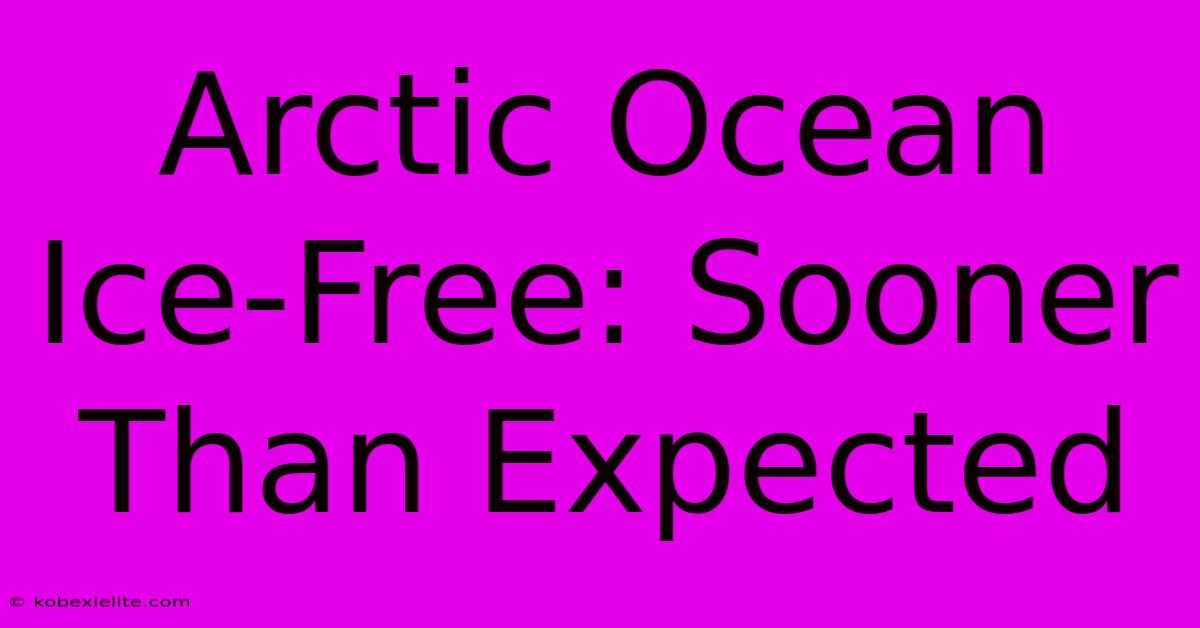Arctic Ocean Ice-Free: Sooner Than Expected

Discover more detailed and exciting information on our website. Click the link below to start your adventure: Visit Best Website mr.cleine.com. Don't miss out!
Table of Contents
Arctic Ocean Ice-Free: Sooner Than Expected
The Arctic is warming at an alarming rate, far exceeding the global average. This rapid warming is leading to a dramatic decline in Arctic sea ice, raising concerns that the Arctic Ocean could become ice-free much sooner than previously predicted. This isn't just an environmental concern; it has significant implications for global climate patterns, wildlife, and even geopolitical stability.
The Accelerating Melt: Why is the Arctic Ice Disappearing So Fast?
The primary driver of Arctic sea ice loss is climate change, specifically the increase in greenhouse gas emissions. These emissions trap heat in the atmosphere, causing a warming effect that is particularly pronounced in the Arctic. This phenomenon, known as Arctic amplification, is amplified by several factors:
- Albedo Effect: Sea ice reflects sunlight back into space. As sea ice melts, it's replaced by darker ocean water, which absorbs more sunlight, leading to further warming and more melting – a vicious cycle.
- Positive Feedback Loops: Melting permafrost releases methane, a potent greenhouse gas, further accelerating warming. Changes in ocean currents and atmospheric circulation patterns also contribute to the accelerated melting.
- Black Carbon: Soot from industrial activities and wildfires settles on the ice, reducing its reflectivity and accelerating melting.
Revising Predictions: A Faster Timeline Than Anticipated
Scientists previously predicted an ice-free Arctic Ocean (defined as less than 1 million square kilometers of sea ice in September) sometime in the latter half of the 21st century. However, recent observations suggest this timeline might be far too optimistic. Several studies now indicate that an ice-free Arctic summer could occur as early as the 2030s, or even sooner under certain scenarios. This drastic revision highlights the urgency of addressing climate change.
The Consequences of an Ice-Free Arctic: A Cascade of Effects
The disappearance of Arctic sea ice has far-reaching consequences:
- Sea Level Rise: While sea ice melting doesn't directly contribute to sea level rise (it's already floating), the melting of Greenland's and Antarctica's ice sheets, accelerated by warmer temperatures, does.
- Disrupted Ocean Currents: Changes in Arctic sea ice affect ocean currents, potentially altering weather patterns globally, leading to more extreme weather events. The Gulf Stream, for instance, could be significantly impacted.
- Threatened Wildlife: Arctic animals like polar bears, walruses, and seals rely on sea ice for hunting, breeding, and resting. Their habitats are rapidly disappearing, threatening their survival.
- Increased Shipping and Resource Extraction: An ice-free Arctic opens up new shipping routes and access to resources like oil and gas. This raises concerns about environmental damage and geopolitical tensions.
- Methane Release: The melting permafrost releases vast amounts of methane, a greenhouse gas far more potent than carbon dioxide, further accelerating climate change.
What Can We Do?
The situation is dire, but not hopeless. Addressing the issue requires a multi-pronged approach:
- Reducing Greenhouse Gas Emissions: This is the most crucial step. Transitioning to renewable energy sources, improving energy efficiency, and adopting sustainable practices are vital.
- Protecting and Restoring Arctic Ecosystems: Conservation efforts are critical to protecting the remaining Arctic wildlife and habitats.
- International Cooperation: Global collaboration is essential to address the challenges posed by an ice-free Arctic, including managing shipping routes and resource extraction.
- Investing in Research: Continued research is crucial to better understand the impacts of Arctic sea ice loss and develop effective mitigation and adaptation strategies.
The Urgent Need for Action: A Call to Global Responsibility
The prospect of an ice-free Arctic Ocean sooner than expected underscores the urgency of tackling climate change. This is not just an environmental issue; it's a global challenge with profound implications for all of us. Delaying action will only exacerbate the consequences, making the future even more uncertain. The time for decisive action is now. We must work together to mitigate the effects of climate change and protect the fragile Arctic ecosystem before it's too late. The future of the Arctic, and indeed the planet, depends on it.

Thank you for visiting our website wich cover about Arctic Ocean Ice-Free: Sooner Than Expected. We hope the information provided has been useful to you. Feel free to contact us if you have any questions or need further assistance. See you next time and dont miss to bookmark.
Featured Posts
-
Can You Finance A Car With No Job
Dec 15, 2024
-
Afl Clubs Unexpected Welcome To Country
Dec 15, 2024
-
Spdy Reg Finance Loan
Dec 15, 2024
-
Wsl Predictions Gameweek 10 Preview
Dec 15, 2024
-
Us Lecce Vs Ac Monza Watch Live
Dec 15, 2024
